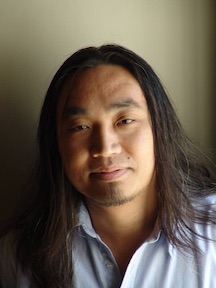By Joe Slama
Yibing Huang at Connecticut College has a foot in two different worlds: poetry and visual art. But to this Chinese poet and champion of the liberal arts, there is an organic synthesis between the two.
Huang, the 2006 Phi Beta Kappa Poet from Connecticut College, has been on the faculty there since 2000 and was appointed acting curator of Chu-Griffis Asian Art Collection in 2016 and now curator in 2018. He holds two Ph.D.s, one in Chinese literature from Beijing University and the other in comparative literature from the University of California, Los Angeles.
Huang shared his Phi Beta Kappa poem with the Key Reporter, including permission to publish it in its entirety, available here. He does not normally give interviews, but he spoke to the Key Reporter about his dual perspective on the world of art and its role in higher education.
“I have two views that can be contradictory,” Huang said. “Poetry, in a way, doesn’t guarantee a profit or usefulness. That is why, when I teach poetry to students, I make that disclaimer.”
“I also have a different standing on this,” Huang continued. “Poetry, it’s really about your mental health, it’s about your own well-being, it’s about your health insurance, it’s about your longevity. In other words, poetry’s importance is like the four elements. It’s as important as air, as water.” In that sense, he said, poetry is highly “useful.”
“Poetry is ultimately the art of words,” Huang explained. “As human beings, we are animals of words. If we do not have poetry, we lose our memory as a species.” And memory preserves this art studied over time. “That’s the importance of the liberal arts,” Huang said. “The real good ones [poems], they will survive, they will endure, they will live forever in eternity.” This endurance is also linked to his role as a curator, in his view, giving “acknowledgement to all those people who were before you,” he said.
Poetry has one ultimate purpose, however, that Huang described with a bluntness befitting a man immersed in wordcraft: “It will make you a better person: that’s the use of it!”
ΦΒΚ Poems have a long history, and a number of chapters still maintain this commencement tradition. Huang’s poem for the ΦΒΚ chapter at Connecticut College finds its theme in discussion of learning and the liberal arts. Speaking to undergraduate members, many of whom stood on the cusp of completing their degrees, Huang delivered a poem, which was originally composed in Chinese, on life outside the university.
Huang’s poem takes a sobering and realistic tone, warning of coming trials in life after baccalaureate celebrations, and it concludes with a tri-point piece of advice: “BE SAFE, BE LOVING, BE LOVED.” But, Huang said, the “middle and radical way” is the most important, referring to the second of those commands.
The piece harkened back to his start in poetry. Huang said that then, “the burden was on myself” to “find my voice.”
“Since I only just started doing this, I do not know the answer,” Huang recalled telling his friends at the time. “I do not know what I am going to get eventually. After 20 years, then you can come back to ask me.”
“After 32 years, in a way I have found my answer,” which is the same as in his 2006 poem, “to go out into the world and find your own voice,” he said.
Huang described the contemporary Chinese poetry with which he grew up as “vibrant” in addressing the aftermath of the Cultural Revolution from 1966 to 1976, and he said that this showed him that poetry is “the most economic, compelling, honest way of finding that voice.”
He sees a similar purpose in his role as curator of the Chu-Griffis Asian Art Collection. The collection began with the acquisition of its first pieces in 1986 by Charles Chu, Professor Emeritus of Chinese at Connecticut College in collaboration with Chu’s friend Hughes Griffis, and it now boasts more than 250 works of art and calligraphy comprised primarily of Chinese painters of the 20th century.
On the one hand, Huang seeks to “preserve the traditions handed down from the past,” while he also wishes to “give it a modern twist and a modern redefinition to make it relatable and relevant to contemporary life, both here in the United States on the East Coast, and also in China and elsewhere,” he said.
This relevance is poignant to Huang when he speaks to visitors at exhibitions he has organized. They tell him “how they feel moved” and “inspired by the art at the exhibition,” even viewers who “have not had much exposure to art,” he observed.
His perspective as a poet aids him in his role as curator, describing it as his task to be a “spokesman for visual art, and to translate some of those meanings into words.”
Speaking directly about Phi Beta Kappa, Huang advised members to “keep true to your original mission, which is love of wisdom.” With the incisive clarity and encouragement characteristic of a poet, he urged: “Love of wisdom is the key to many puzzles of our life and contemporary world. Keep that love pure, and you will get rewarded.”
Joe Slama, a senior at Truman State University studying Classics, was inducted into Phi Beta Kappa in spring 2017 while studying and working in Rome. Truman is home to the Delta of Missouri chapter of Phi Beta Kappa.




